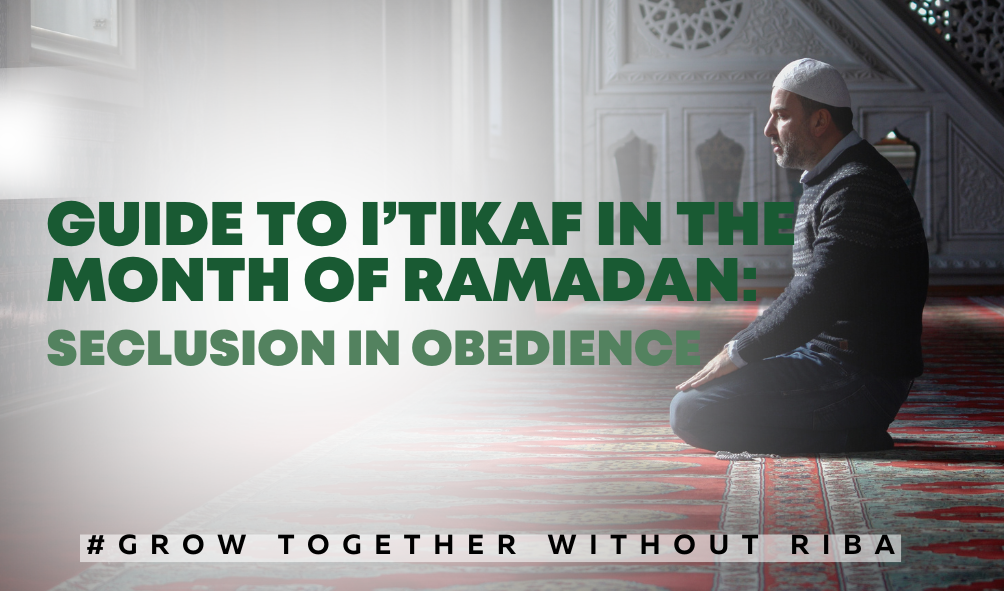Guide to I’tikaf in the Month of Ramadan: Seclusion in Obedience
The month of Ramadan is a special time for Muslims around the world. Besides being a month of fasting, Ramadan is also known for special acts of worship such as i’tikaf. I’tikaf is a spiritual tradition involving seclusion in the mosque to focus on worship and self-reflection. In this article, we will discuss a complete guide to performing i’tikaf effectively and beneficially.
Definition of I’tikaf:
I’tikaf in Shariah means: “Staying in the mosque to perform obedience to Allah Ta’ala by a specific person with a specific intention.”
Evidence for the Legitimacy of I’tikaf:
I’tikaf is sanctioned by the following dalils:
a.Surah Al-Baqarah, verse 187:
“And do not have relations with them as long as you are staying for worship in the mosques.”
Also Read:
Akhlaq Lessons from Ramadan Fasting
The Virtue of Offering Iftar in the Month of Ramadan
b. Surah Al-Baqarah, verse 125:
“And [mention] when We made the House a place of return for the people and [a place of] security. And take, [O believers], from the standing place of Abraham a place of prayer. And We charged Abraham and Ishmael, [saying], ‘Purify My House for those who perform Tawaf and those who are staying [there] for worship and those who bow and prostrate [in prayer].'”
c. Hadith of Aisha (may Allah be pleased with her):
“Aisha (may Allah be pleased with her) reported that the Prophet (peace be upon him) used to observe i’tikaf during the last ten days of Ramadan until Allah took his soul. Then, his wives observed i’tikaf after him.” (Muttafaqun ‘alaih)
Legal Ruling of I’tikaf:
I’tikaf itself is a recommended act (sunnah) and not obligatory unless one has made a vow (nadhr).
Timing of I’tikaf:
Originally, I’tikaf is recommended at any time, but it is highly recommended during Ramadan, especially in the last ten days.
Also Read:
Implementation of The Zakat System in The Modern Era
The Virtue of Charity in the Month of Ramadan
Duration Required for I’tikaf:
There are differences among scholars regarding the minimum duration for one to be considered in I’tikaf. However, the majority view is that merely a short period (even as little as 5 minutes) spent with the intention of I’tikaf in the mosque is sufficient to be considered in I’tikaf. However, it is highly recommended to stay at least overnight to truly experience the essence of I’tikaf, which is solitude for worship.
Place of I’tikaf:
I’tikaf must be performed in a mosque where congregational prayers are held regularly. This is mentioned by Ibn Qudamah as follows: “It is not permissible to perform I’tikaf except in a mosque where congregational prayers are held, because congregational prayer is obligatory. Performing I’tikaf in a mosque where there is no congregational prayer leads to one of two things: either abandoning the obligatory congregational prayer or leaving the mosque to attend it, and this happens repeatedly, which contradicts the essence of I’tikaf, which is adhering to the mosque and staying obedient to Allah.”
Also Read:
Islamic Economic System and the Prohibition of Interest (Riba)
Cara Kaya Tanpa Modal : Rahasia Sukses yang Terbukti, Memang Bisa?
Leaving the Mosque during I’tikaf:
There are three scenarios when leaving the mosque during I’tikaf:
a. Leaving the mosque for necessary acts such as using the restroom or buying food if there is none in the mosque is permissible.
b. Leaving the mosque for non-obligatory acts of worship, such as visiting the sick or attending to a funeral, nullifies I’tikaf unless it was intended at the beginning of I’tikaf, such as planning to visit a sick friend on a specific day during I’tikaf.
c. Leaving the mosque for unnecessary matters like shopping nullifies I’tikaf.
It should be noted that when someone in I’tikaf leaves the mosque for permissible reasons like eating and using the restroom, they must return immediately after fulfilling their needs outside the mosque if they do not want their I’tikaf to be interrupted.
Also Read:
Muda Foya Foya, Tua Kaya Raya, Mati Masuk Surga: Bisakah Demikian?
Kisah Pemilik Dua Kebun di Dalam Surat Al-Kahfi
Primary Worship During I’tikaf:
It is preferred to engage in ritual worship during I’tikaf such as prayer, Quran recitation, remembrance of Allah, supplication, etc. This is because I’tikaf is a special time for a servant to dedicate their time and energy to draw closer to Allah, and this is more effectively done through pure and ritualistic worship like prayer and Quran recitation rather than other activities or permissible actions performed with the intention of worship such as studying or working.

These are some of the things that a Muslim should know when intending to perform I’tikaf during the month of Ramadan, especially in its last ten days. May Allah facilitate and accept our worship during I’tikaf and enable us to encounter Laylat al-Qadr while in I’tikaf.
Also Read:
Tips Budgeting Keluarga untuk Menunaikan Pembayaran Zakat
Satu Lembah Emas Pun Tidak Cukup
Wallahu a’lam
References:
- Surat Al-Baqarah Ayat 125. (n.d.). Tafsir AlQuran Online. Retrieved March 12, 2024, from https://tafsirq.com/2-al-baqarah/ayat-125
- Surat Al-Baqarah Ayat 187. (n.d.). Tafsir AlQuran Online. Retrieved March 12, 2024, from https://tafsirq.com/2-al-baqarah/ayat-187
- MSc, M. A. T. (2013, July 27). I’tikaf di Sepuluh Hari Terakhir Ramadhan. Rumaysho.com. https://rumaysho.com/3506-i-tikaf-di-sepuluh-hari-terakhir-ramadhan.html
- ST, M. N. I. M. (2011, August 19). Fiqih Ringkas I’tikaf (1). Muslim.or.id. https://muslim.or.id/6745-fiqih-ringkas-itikaf-1.html







